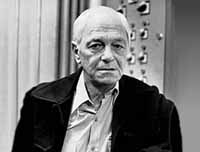Branko Bauer facts for kids
Branko Bauer (born February 18, 1921 – died April 11, 2002) was an important Croatian film director. Many people think he was the most important director of classic movies in Croatia and Yugoslavia during the 1950s.
Contents
Becoming a Film Director
Branko Bauer loved movies from a young age. When he was a schoolboy, he often went to cinemas in Zagreb. This was during World War Two, when his country was occupied.
In 1942, Branko and his father, Čedomir Bauer, bravely hid their Jewish neighbor, Ljerka Freiberger. They protected her from the police who were working with the bad guys. Because of their brave actions, a special group called Yad Vashem gave them an honor in 1992. This honor is called Righteous Among the Nations, which means they were very good people who helped others.
In 1949, Branko started working at a film studio in Zagreb called Jadran Film. He began by making short films that showed real life, called documentaries. His first big movie was an adventure film for kids in 1953. It was called The Blue Seagull (Sinji galeb). This movie was special because it looked very lively and the actors seemed very real. It was different from other movies made in Yugoslavia at that time.
Famous Movies by Branko Bauer
Don't Look Back, My Son
Branko Bauer became one of the most respected directors after his third movie. This was an exciting war movie from 1956 called Don't Look Back, My Son (Ne okreći se sine). The movie is about a hero fighting in World War Two. He escapes from a very bad prison camp.
He goes back to Zagreb to find his son. He wants to join the freedom fighters in the countryside. But he finds out his son is in a school run by the bad guys and has been brainwashed. The hero manages to escape the city with his son. But he has to lie to his son about what they are doing to keep them safe. The ending of the movie was inspired by the Disney film Bambi.
Three Girls Named Anna
Bauer's next movie was a drama from 1957 called Only People (Samo ljudi). This movie didn't do very well with critics. This was because dramatic movies about feelings were not seen as serious in Yugoslavia back then.
After that, Bauer made Three Girls Named Anna (Tri Ane) in 1959. This movie was about real life and showed things as they were. It tells the story of an old man who lives alone. He believes his daughter died as a child during World War II. Then, he gets news that she might have survived. She could be living with another family now.
Bauer showed the struggles of poor people after the war in a very real way. The government didn't like this honest look at society. So, the movie was never shown in cinemas. But today, many people think Three Girls Named Anna is one of Bauer's best and most important films.
Bauer's next two movies were more popular. These were the comedy Martin in the Clouds (Martin u oblacima) from 1961. And the movie Superfluous (Prekobrojna) from 1962. This movie helped make Milena Dravić a big star in Yugoslavia.
Face to Face
One of Bauer's most famous movies is Face to Face (Licem u lice) from 1963. This movie is seen as the first political film made in Yugoslavia. It's about a worker who speaks up against a manager. This happens during a meeting at a big construction company.
At first, the movie was seen as risky because of its political message. But then, government officials supported it. This showed other filmmakers that it was okay to talk about important social topics in movies. Another director, Živojin Pavlović, said Face to Face was the most important movie made in Yugoslavia at that time.
Later Career
In the 1960s, movies in Yugoslavia started to change. They became more modern and focused on the director's personal style. Branko Bauer found it hard to fit into this new style. He made two movies that weren't very successful. After that, he had trouble getting money to make new films.
In the 1970s, he directed a popular TV series. It was called Salaš u malom ritu (1976). This was a war drama set in Vojvodina. It became one of the most remembered TV shows in Yugoslavia.
Filmography (as director)
- The Blue Seagull (Sinji galeb, 1953)
- Millions on the Island (Milijuni na otoku, 1955)
- Don't Look Back, My Son (Ne okreći se sine, 1956)
- Only People (Samo ljudi, 1957)
- Three Girls Named Anna (Tri Ane, 1959)
- Martin in the Clouds (Martin u oblacima, 1961)
- Superfluous (Prekobrojna, 1962)
- Face to Face (Licem u lice, 1963)
- Nikoletina Bursać (1964)
- Doći i ostati (To Arrive and to Stay, 1965)
- Fourth Companion (Četvrti suputnik, 1967)
- Salaš u Malom Ritu (A Farm in Mali Rit, 1975)
- Boško Buha (1978)
 | Dorothy Vaughan |
 | Charles Henry Turner |
 | Hildrus Poindexter |
 | Henry Cecil McBay |


